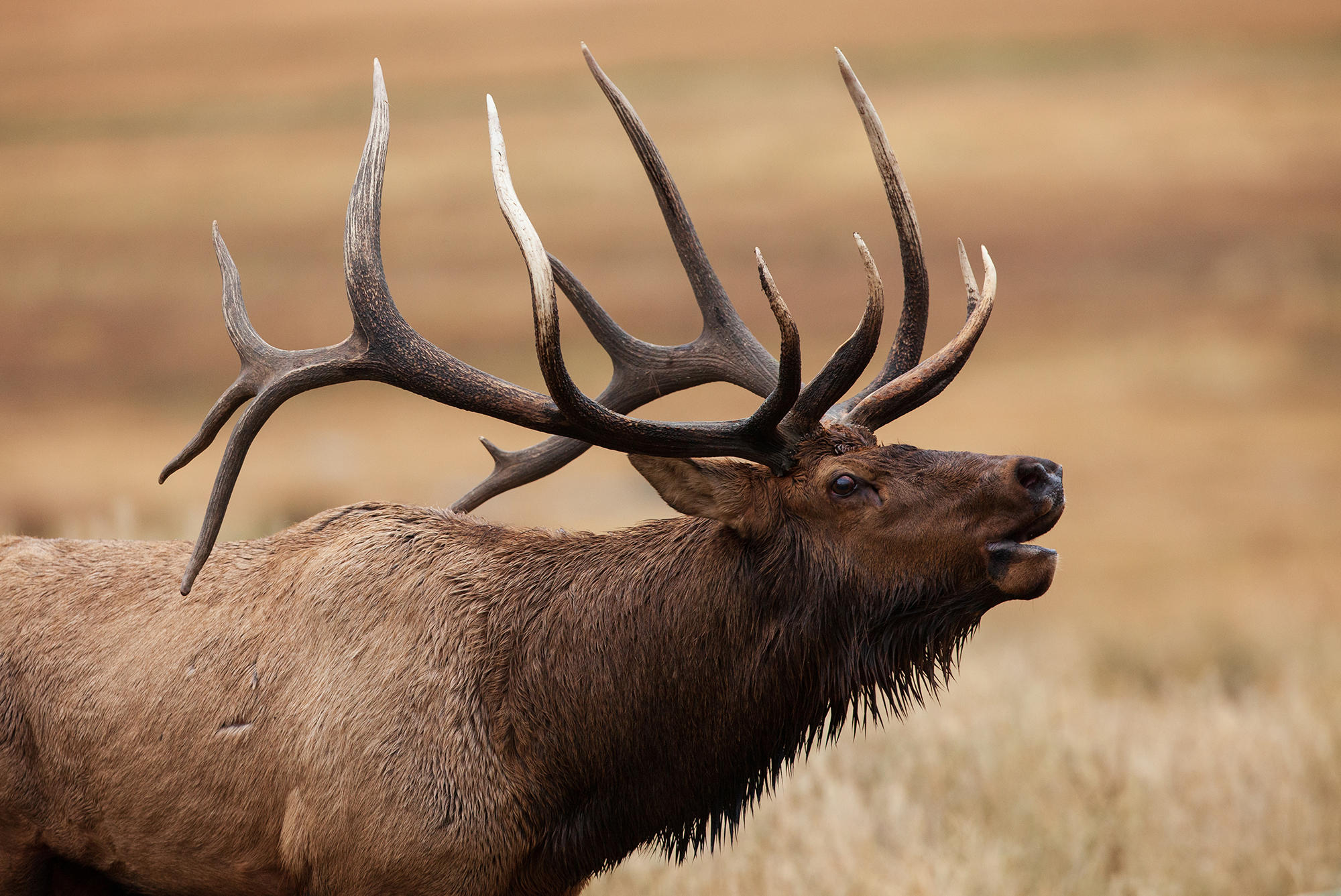This story, “Elk by Error,” originally ran in the June 1947 issue of Outdoor Life.
CAUTIOUSLY I shifted my eyes. A thousand feet under my boots I could see white water whipping a jig-saw canyon. The trail, cut through solid rock, was not quite wide enough for the hoofs of Barfly, my saddle horse, but somehow he managed to balance himself like a tightrope artist. Wings, I thought, would be convenient appendages if Barfly should suddenly make a misstep and go spinning into space.
Since daylight we had climbed, working our way around vertical ledges and rims of canyons so immense that a man on a horse was like a microbe crawling across the flange of infinity. Somewhere beyond lay the continental divide, the backbone of America that saw-toothed through Wyoming.
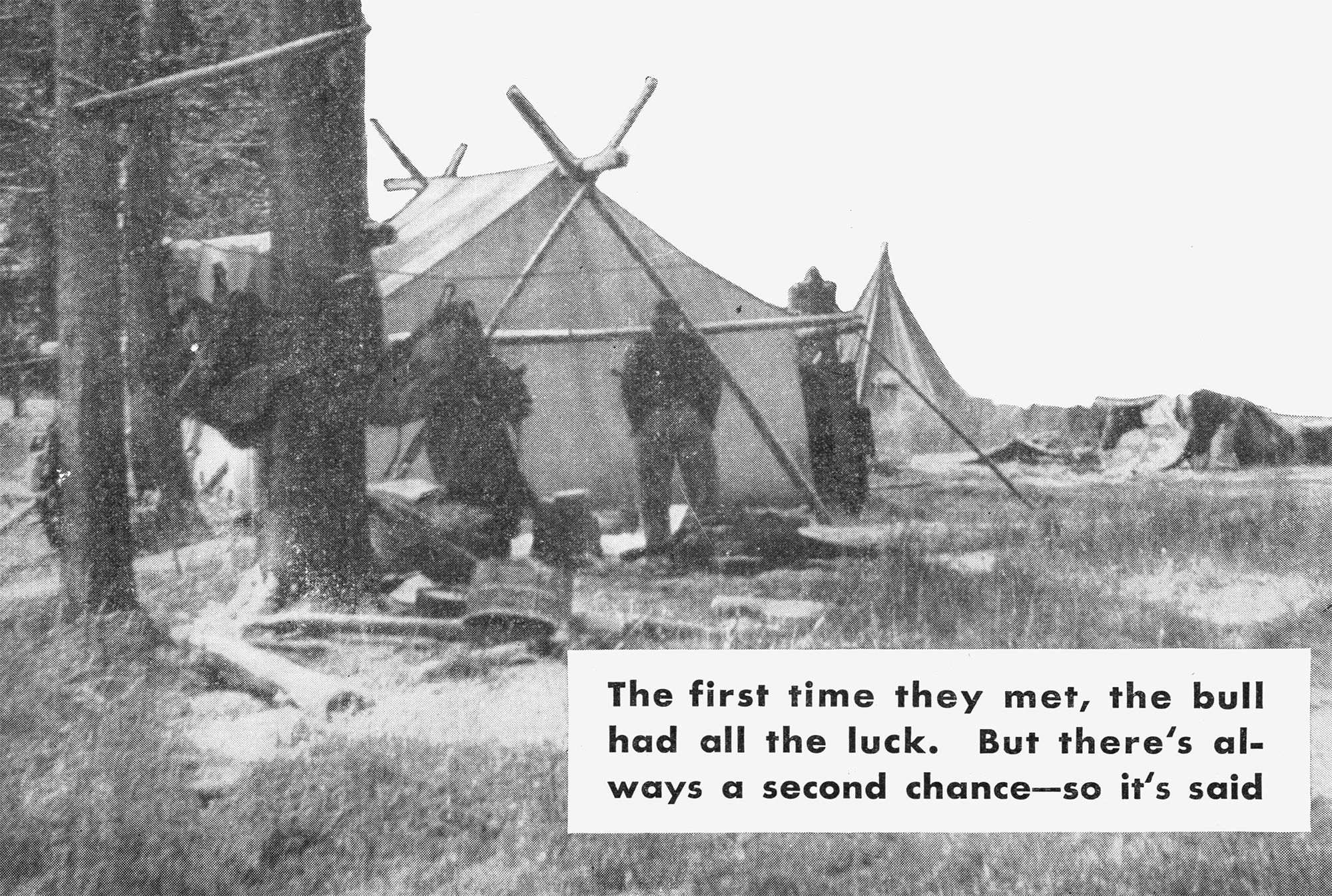
Once when I had dared to raise my eyes, I had seen it, bulwarked against a graying sky. Max had told me that we would cross this rooftop of the West through an 11,000-foot pass. And this would put us into the Thoroughfare country, the West’s finest game region. But at that moment the altitude did not worry me so much as the problem of helping Barfly maneuver the narrow seam of rock that someone with goat tendencies had marked out as a trail.
I WAS beginning to wonder how long the law of averages would keep us balanced on the ledge, when the trail widened, crossed a rockslide, and dipped into the timber. We swung sharply down a series of switchbacks and met the boiling creek above a gigantic waterfall. Max had already pivoted out of his saddle and Monte Jones was fumbling for liquid nourishment in one of his saddlebags.
“You’d better crawl into your slicker,” Max said. “It’s going to rain.”
The yellow raincoat was stiff from the cold. Where it had been rolled into a bundle, the fabric was stuck together like flypaper. I pried the creases loose and pulled the slicker on over my bulky jacket.
While Barfly had his nose submerged in the ice water of the creek, I looked around. The fringe of balsam and spruce we had ridden into a few minutes before dipped to the creek. Under this forest canopy the air was heavy with a sharp, resinous tang. I filled my lungs with the perfumed scent and exhaled slowly. Max thought it was a sigh.
“The tough part is ahead,” he said, grinning broadly.
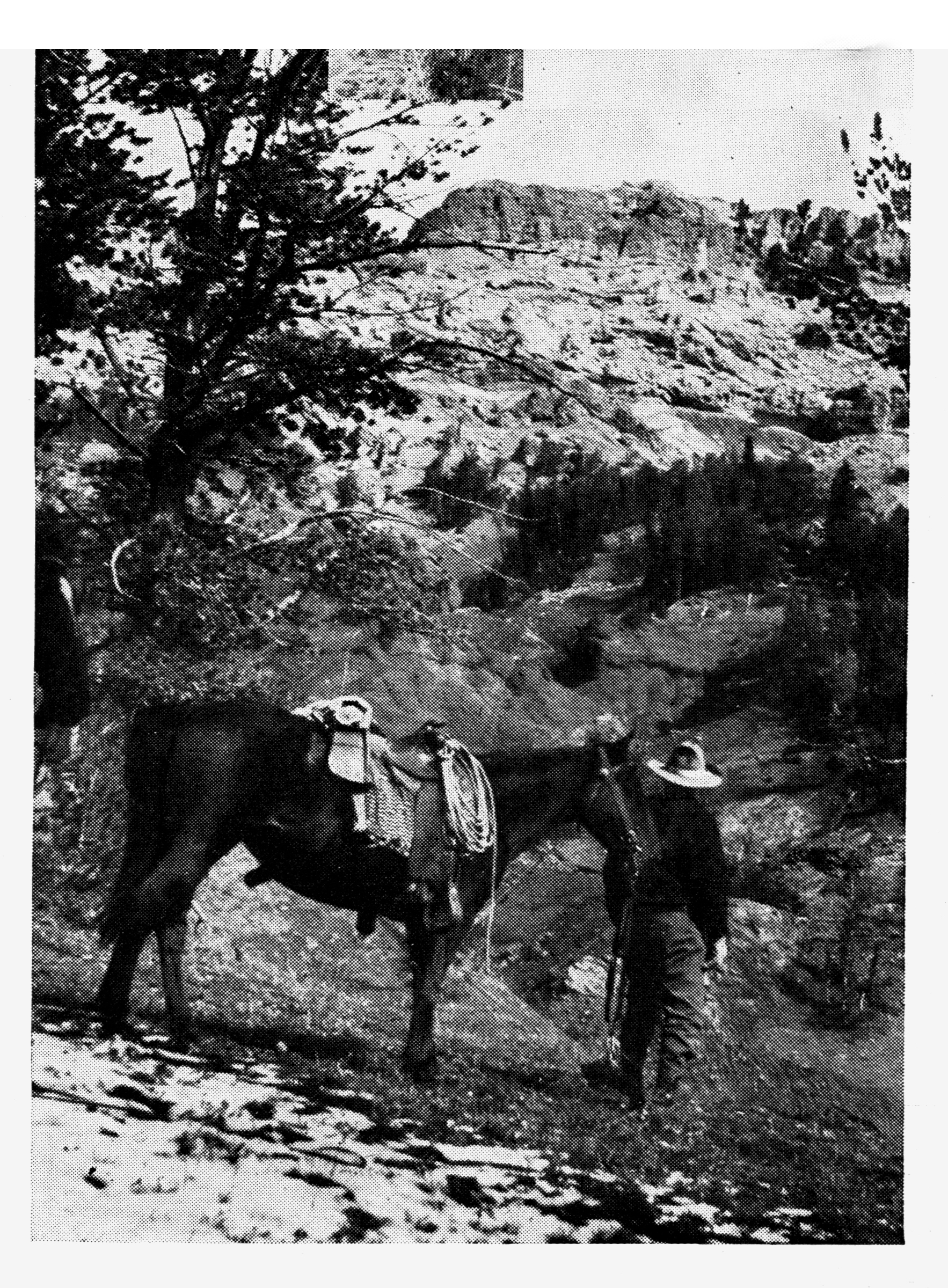
We splashed through the creek, over round glacial stones, and climbed abruptly up the other side. The air was- suddenly filled with fine particles of water which grew heavier and larger. In a matter of seconds they had developed into a downpour of cold rain which shut out the peaks and sky, and left us plodding through a sodden wilderness of rocks, brush, and mud.
With rain beating into my face and running in a little rivulet down my saddle, I bumped along, trying to remember what Tom Molesworth had said a few. days before while we jogged beside the sunny Shoshone River. I had pointed out a jagged rim behind the ranch, where Dick Loftsgarden, the foreman, and I left fingernails and horsehair on the rocks when we made a new trail across the edge of nothing. Tom had looked for a long minute at the needled tips.
“If you carried horses around the edge of that rim,” he said, “your trip with Max will be like a buggy ride.”
I tried to remember whether or not Tom’s eyes had crinkled at the thought of comparing any climb across the great divide with a buggy ride.
Especially a trip with Max Wilde into the high country after elk. I have an honest wish that every American who loves a gun, a horse, and the silence of the big woods, could know Max Wilde. In other years his name would have been bright in that constellation of outdoorsmen which includes Daniel Boone, Davy Crockett, Jim Bridger, and others of the westward-pushing frontier.
The rimrock, the canyons, the timbered valleys-they are as much a part of Max as the graying wool under his five gallon hat. He is tough with the toughness of men whose lives are lived beyond where the trails run out. This mountain man was once a scout for Buffalo Bill, and in the years before he settled down to wrangling dudes, he left his hobnail prints in the dirt from Alaska to Mexico.
Max Wilde belongs to a race of vanishing woodsmen who grow on new frontiers and disappear when cities and roads move in.
Now a slow fire smoldered along my veins. I glowed with the thought that I would have a few days with one of the great guides of the West.
We crossed the point of a ridge and started the last climb to the divide, 1,000 feet above us. The rain had soaked through my boots and buckskin gloves; and now my toes and fingers began to ache from the cold. I beat my hands together-and Barfly almost jumped off the narrow trail.
After that I let them ache and gradually grow numb. I was conscious of jagged tips of rimrock that towered around us. Somehow the trail threaded the tower walls and leveled into a pass, more than 11,000 feet above high tide.
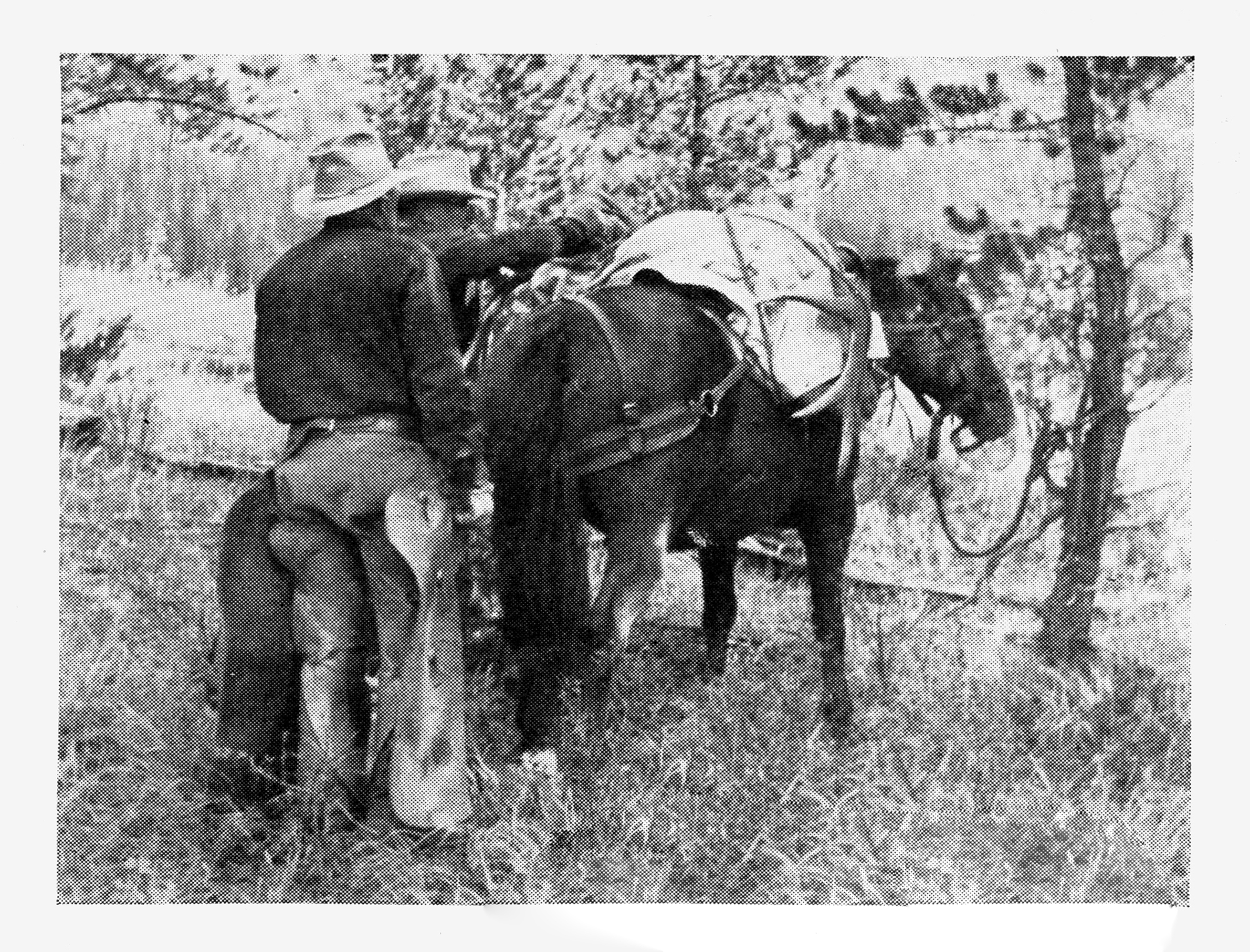
THE WIND on the western side of the pass was sweeping uphill, stinging my face with icy water. Breathing was not easy. I gave Barfly his head and hunched in the saddle, trying to keep some semblance of warmth in my body. Now and then I caught a glimpse of Max, who had become a wraith bobbing through this nebulous world.
Some time later, it could have been minutes or hours, we grazed a stubby balsam and I found myself in trees that sang in the wind with high-pitched voices. I remember that this highland forest held no beauty for me. I was too cold and wet and miserable. I had only one thought. Some sweet day I would carry Tom Molesworth on a Wilde buggy ride!
The hunting camp had been pitched a month before on the edge of an open meadow, at the junction of two creeks. The forest trees were tall, and sheltered the tents from the wall of wind that rode the valley floor. Barfly had halted beside a pole corral. I called on my last reserve of sinew and enthusiasm, and managed to slide out of a saddle which had once been leather-but now felt like well-set cement.
I dragged the saddle off Barfly’s steaming back, hung it on a rack beside the corral, and covered it with the raincoat to protect it from the weather. I followed Max and Monte into the chow tent. Grand Hotel never looked or felt any better than that tent. The wranglers and guides among whom were Erle, Clyde, and Jim, were there, waiting for supper. They all had the lanky, rawhide build of the Westerner, with small waists, and seat cheeks the size of hand grenades.
Someone lighted a lamp, then the table was full of steaming elk steaks, potatoes and gravy, hot stewed fruit, and coffee. In my heart I have pity for any person who has never eaten a meal like that.
The last thing I remember before I crawled into my sleeping bag was music—a soothing symphony of wind in the spruce, of splashing water and low voices beyond the circle of darkness.
When I opened my eyes the walls of the tent were gray. The thud of hoofs told me that the wrangler had saddled his mare and gone to round up the horses. With a supreme effort I pulled out of the blankets and jerked on my clothes. I was amazed to find that all my muscles worked. The dawn was clear. I combed the caked mud out of Barfly’s coat and tightened the cinch against his swelled belly. From the saddle I watched Max load his saddlebags with binoculars, cartridges, sandwiches, and a small hand ax.
“Where are we going?” I asked.
“There are some big elk,” he said, “in Hidden Valley.” We took the trail that led down the creek. It twisted through the woods, crossed the edge of a canyon, and came back to the running water over a series of giant, forested steppes. Once Max stopped his horse and pointed out tracks in the trail ahead.
“Grizzly,” he said. “If we bump into him, come off shooting.”
At the creek we left the trail, crossed the main stream, and climbed abruptly to a narrow bench which lay between two massive mountains. At the head of this corridor, the trail spiraled upward again for several hundred yards, sliced the edge of a flat ridge, and dipped suddenly into a high meadow that overlooked Hidden Valley.
Eden itself never made a picture like this. The valley, with a blue stream streaking through it, was covered with a million pointed Christmas trees. Beyond the slopes, which were themselves too massive to believe, the rimrock stood like a mighty rampart of a Gargantuan world. The color, the grandeur, the silence, were beyond mere human comprehension.
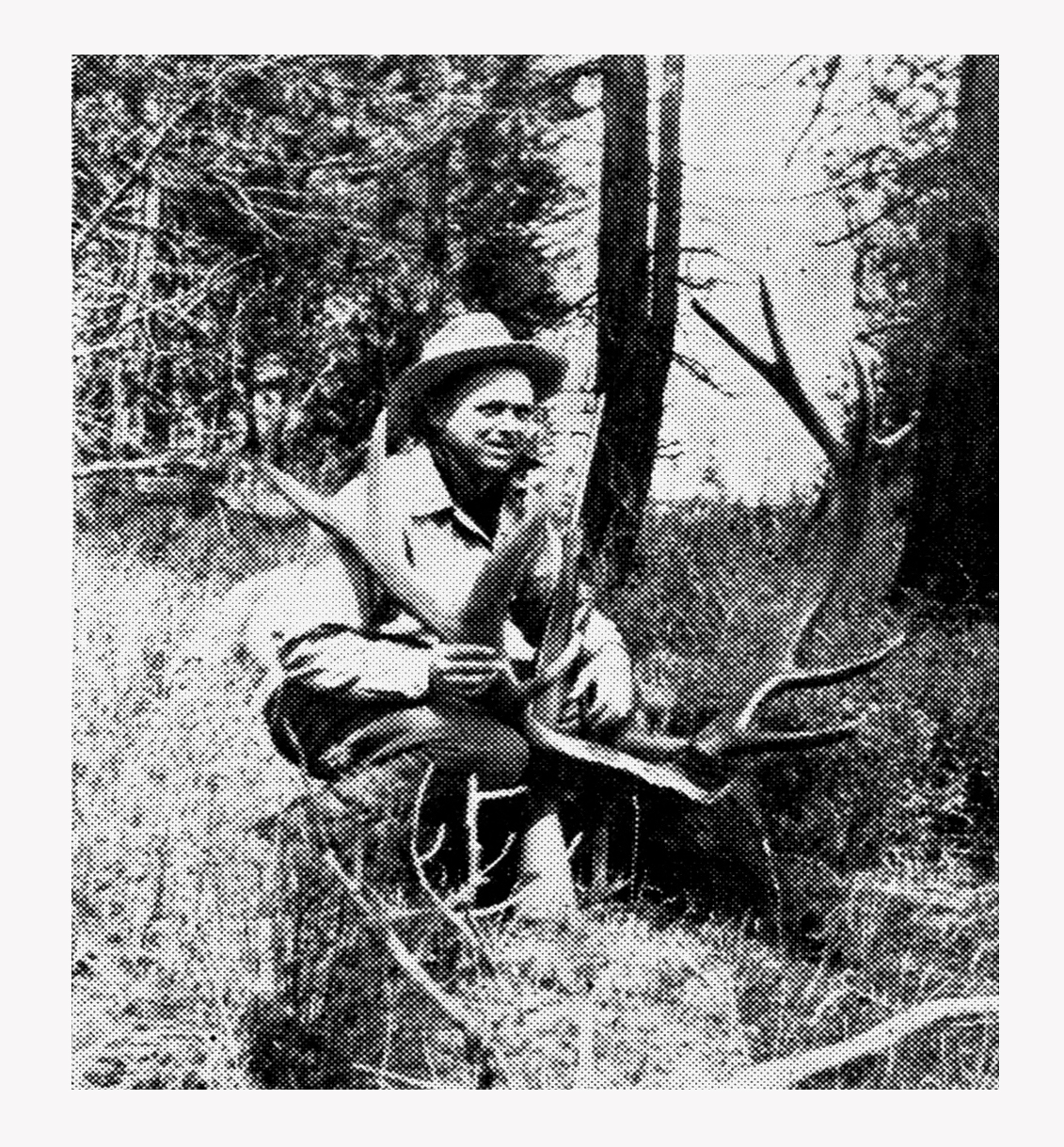
“Damn,” Max said faintly, under his breath.
He moved on slowly and I followed. I’ll see that picture as long as the wheels turn over in my brain.
The trail lay up one side of Hidden Valley. It wound in and out of the forest, across meadows and small canyons where feeder streams rushed to join Hidden Creek. Once Max pulled up his horse and pointed. Two bull moose foraged knee-deep in a bog. They raised massive heads and looked us over, unafraid.
“Quite a few of the critters in this valley,” the guide said. He kicked his horse up the trail, and the moose went back to browsing the tender shoots in the bog.
I was riding along, stretching my neck and thinking how insignificant the Empire State Building would be beside the valley rim, when Max pulled his horse up short in the trail. A clear whistle, having the qualities of a flute and ending abruptly in a musical bellow, filled the forest. It was a wild, beautiful sound that fitted perfectly into the picture-world we moved in.
“King size,” Max whispered. “Let’s look.”
He stepped off his horse and dropped the bridle reins on the ground. Clicking a cartridge into the chamber of my .30/06, I followed the woodsman on a long detour through the woods. Within 100 yards we stopped and Max whistled.
Almost immediately the answer came. It was so close that I jumped. We slipped around a balsam thicket. There, less than fifty yards away, was the biggest elk I had ever seen. He was rubbing his massive antlers against a small fir, stripping it of limbs, needles, and bark. Now and then he paused to raise his head and yodel. The sound was as huge as the animal itself, rolling like a bugle call across the valley to the slopes beyond.
Max was studying him through the glasses, examining the broad beams of the monster’s fighting tools. He lowered his binoculars and shook his head.
“Won’t do,” he said under his breath. He saw the question in my eyes and pointed out the difference in the two antlers. “Those odd-shape horns lack proper balance. The left horn is perfectly formed. But on the right one the brush hook is missing and the royal point is much shorter.”
We stepped out of the brush then.The elk threw up his head. I thought he was going to charge us, but after a long moment the big animal turned and walked majestically into the shadows of the big-timbered slope behind him.
I was glad that the goose bumps were hidden under my shirt where Max could not see them.
In the course of the next two hours I decided that we had stumbled into an elk corral. Every few minutes one of the animals sent a challenge ringing across the valley. To most of them Max paid little heed.
“Too high-pitched,” he explained, when I called his attention to one of the wild calls. “That’s a yearling or a two-year-old critter.”
At the upper end of the valley, where the peaks stood so massive that they were breath-taking, we stopped on an open hill. Below and beyond lay a broad, open meadow. Almost immediately below us we could see three young bulls. One was foraging in the yellow grass. Two more were pushing each other around with antlers that would have set fire to the blood of most hunters I know.
“They’re playing,” Max said. “However, the last fight I saw was just above here on the hill. A lone bull was stalking another big fellow with a herd of cows. The challenger maneuvered around and got on the uphill side. Then he charged, driving the herd bull fifty feet down the mountainside, but never bowling him off his feet. Then the newcomer backed off arid charged again. This time he didn’t budge the big bull. That convinced him; he turned and hit for the tall trees under the rimrock.”
Max swept the meadow with his glasses. “That might be the herd bull at the upper edge of the valley,” he said. “There are about twenty cows in the bunch and one big bull. We’ll go look them over.”
The elk were more than a mile away. We rode into the timber and around the foot of the slope, through windfalls and massive boulders which in ages past had broken off the rimrock and crashed into the valley. After twenty minutes the mountain man slid off his horse and pulled the rifle from its scabbard. We started another of those noiseless stalks.
I don’t know what made me freeze in my tracks. Possibly it was because Max had frozen in his. A cow elk had suddenly appeared in the forest, less than forty feet away. A second cow was close behind her. They paused briefly to look us over, then moved on unhurriedly up the little draw. I counted twenty cows, then Max said in a voice so low that I could hardly hear him, “Get ready.”
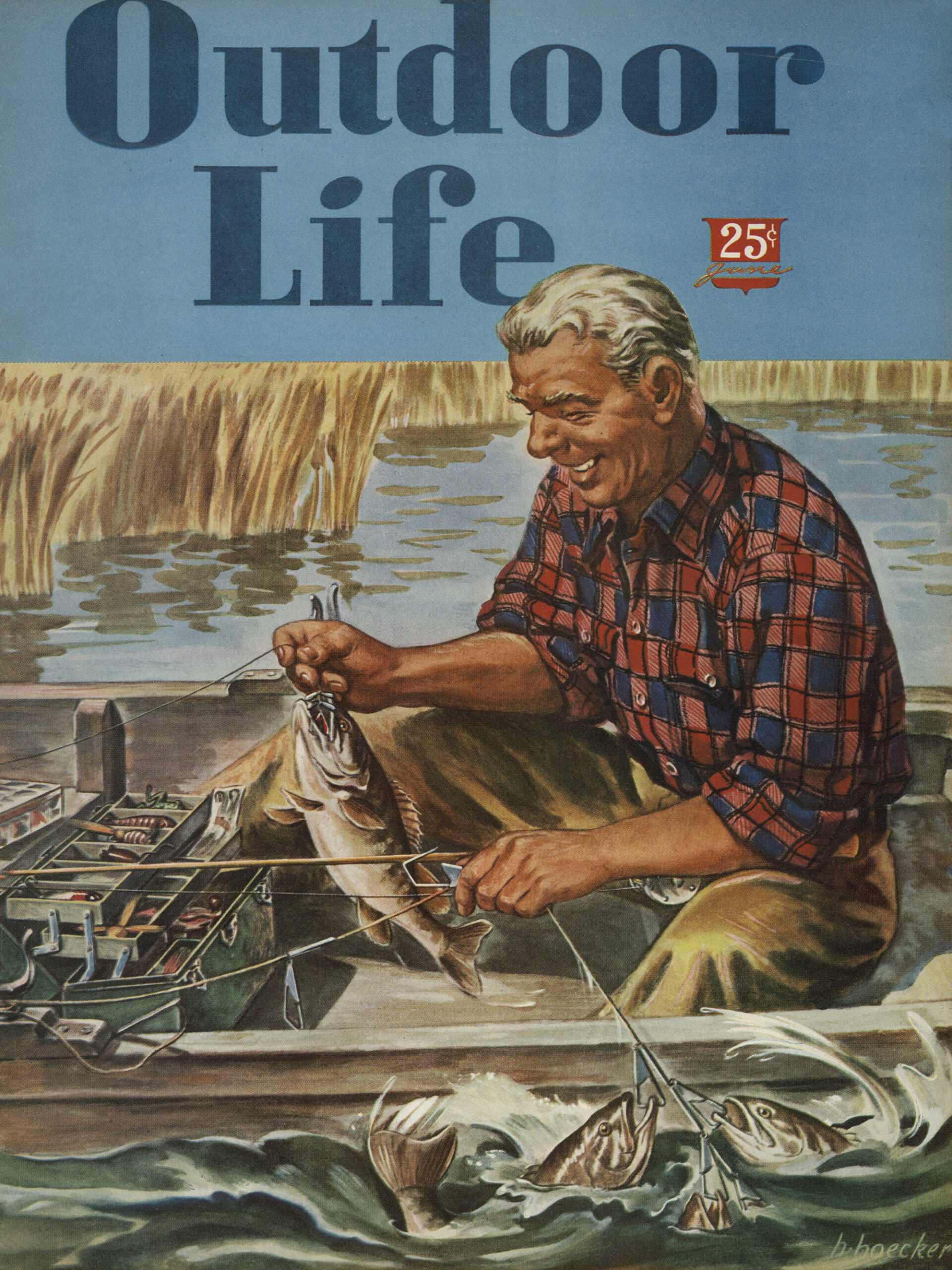
The big bull was there, filling up space where a glade had been. I cautiously lined up the sights of my rifle with his neck. Max whistled, a long, low yodel like a challenging bull. The lord and master of the herd threw up his head at an alert angle. Max had the binoculars on him.
“Not the one,” he said. “Let him go.” I lowered the gun. The bull saw the movement, gave a startled jump, and spooked into the woods.
We crossed the valley and worked our way through the forest to the other side. Once we stopped and listened to a big elk, bugling where the rimrock met the woods, but the animal was traveling fast and went out of hearing around the mountain slope while we listened.
It was late in the afternoon when we stopped in a little glade that overlooked the valley. Where the grass was knee deep we left our horses to graze and climbed up on a mossy log for a smoke.
“I’ve never spent a better day in the woods,” I said.
“It has been fine,” Max said slowly. “I always sort of hate to kill, because then the fun of hunting is over.”
Even from the best guide in the West, such words did not come as a surprise. I would have expected Max Wilde to say that.
Again he swung his glasses slowly across a clearing under the rimrock, then back into the valley. I felt, rather than saw him stiffen. “Man alive!” he exploded. “Look at that!”
I did not need glasses to see the bull step out of the timber across the valley. He was in sight only a moment. The huge beast must have sensed us. He vanished, then appeared on a little hillock, going away.
“He’s got a beaut of a rack,” Max said. “Take him!”
My first bullet cut a twig and went over the bull’s back, a foot high. I saw it knock bark from the edge of a spruce. The bull made three long steps forward, as though gathering speed to take off for the cliff tops. At my second shot he took two more steps and pitched head downward into the edge of the timber, and never moved.
I hardly remember climbing aboard Barfly. We must have traversed the valley in a matter of seconds. We dismounted at the edge of the forest and walked around the kill.
“Well, I’ll be damned,” Max snorted.
“What’s wrong?” I asked. He looked at me grimly. “It’s the same bull we passed up this morning,” he groused, “the one with the odd horns.”
His chagrin was so complete that I laughed aloud. Across the clearing he had seen only the perfect left antler through his glasses.
“Max,” I said, “this is the first elk I ever killed. I’d rather have this set of antlers than the biggest and most perfect ones you ever saw roaming in the woods.”
Those were the most honest words I ever said. The mountain man gave me a long look that held more meaning than any spoken reply he could have made.
Finally he smiled and said, “Well, get out your knife and whet it. We’ve got a job ahead.”
The stars were like a million candles when we rode into camp before midnight. My face, hands, and feet bore some small resemblance to frozen elk steak, but the warmth of achievement was beating through my veins. Even tired Barfly was stepping high.
I knew it was so trite that I didn’t bother to tell anyone this time, but in my heart I felt this had been the finest day I’d ever spent in the woods.
Read more OL+ stories.
